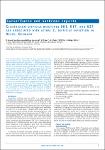Clostridium difficile ribotypes 001, 017, and 027 are associated with lethal C. difficile infection in Hesse, Germany
Arvand, M.
Hauri, Anja M.
Zaiß, Henning
Witte, Wolfgang
Bettge-Weller, G.
From January 2008 to April 2009, 72 cases of severe Clostridium difficile infection were reported from 18 different districts in the state of Hesse, Germany. A total of 41 C. difficile isolates from 41 patients were subjected to PCR ribotyping. PCR ribotype (RT) 027 was the most prevalent strain accounting for 24 of 41 (59%) of typed isolates, followed by RT 001 (eight isolates, 20%), RT 017 and 042 (two isolates each), and RT 003, 066, 078, 081, and RKI-034 (one isolate each). Eighteen patients had died within 30 days after admission. C. difficile was reported as underlying cause of or contributing to death in 14 patients, indicating a case fatality rate of 19%. The patients with lethal outcome attributable to C. difficile were 59-89 years-old (median 78 years). Ribotyping results were available for seven isolates associated with lethal outcome, which were identified as RT 027 in three and as RT 001 and 017 in two cases each. Our data suggest that C. difficile RT 027 is prevalent in some hospitals in Hesse and that, in addition to the possibly more virulent RT 027, other toxigenic C. difficile strains like RT 001 and 017 are associated with lethal C. difficile infections in this region.
Dateien zu dieser Publikation
Keine Lizenzangabe
Verwandte Publikationen
Anzeige der Publikationen mit ähnlichem Titel, Autor, Urheber und Thema.
-
2015-10-07ZeitschriftenartikelTracing the Spread of Clostridium difficile Ribotype 027 in Germany Based on Bacterial Genome Sequences Steglich, Matthias; Nitsche, Andreas; Müller, Lutz von; Herrmann, Mathias; Kohl, Thomas A.; Niemann, Stefan; Nübel, UlrichWe applied whole-genome sequencing to reconstruct the spatial and temporal dynamics underpinning the expansion of Clostridium difficile ribotype 027 in Germany. Based on re-sequencing of genomes from 57 clinical C. difficile ...
-
2007-11-15ZeitschriftenartikelA case of Clostridium difficile-associated disease due to the highly virulent clone of Clostridium difficile PCR ribotype 027, March 2007 in Germany Zaiß, Henning; Weile, J.; Ackermann, G.; Kuijper, Ed J.; Witte, Wolfgang; Nübel, Ulrich
-
2009-01-08ZeitschriftenartikelTyping Clostridium difficile strains based on tandem repeat sequences Zaiß, Henning; Rupnik, Maja; Kuijper, Ed J.; Harmanus, Celine; Michielsen, Dolf; Janssens, Koen; Nübel, UlrichBackground: Genotyping of epidemic Clostridium difficile strains is necessary to track their emergence and spread. Portability of genotyping data is desirable to facilitate inter-laboratory comparisons and epidemiological ...

